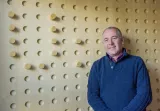
English Teacher and Pilot: Meet Ian Young
1/ A short description: (Who are you? Where are you from? How long have you been in the Czech Republic? How long will you stay here?)
I was born in Manchester but moved to the south of England in the mid-eighties. My previous careers in aviation and engineering took me around the world, but home for the last fifteen years has been Bristol in England’s south west.
We moved to Pardubice just over a year ago, partly so we could give our children a new cultural experience and also to take advantage of the outdoor pursuits the central European weather allows.
2/ You mentioned that you used to be a former airline pilot, and now you work as an English teacher at the faculty of Arts and Philosophy.
How did you decide that you wanted to work as an English teacher?
It is very different from your previous job, how do you feel about it?
My mum was a librarian and I spent most of my school holidays in the library. You could say that books were my babysitters. I went to university later in life and studied English literature. The move into teaching isn’t really new; I’ve been involved in teaching for over twenty-five years. I started my career as an engineer and among other responsibilities, I managed the company’s training department, writing and presenting training courses for engineers and commercial staff. Later, as a flying instructor, I managed a flying school before my career took me to the airlines. For the last five years I’ve been training aspiring airline pilots, both in the classroom and a flight simulator. It’s something I still do, when the time allows.
It has always been an ambition to finish my working life in the teaching profession and the work I do at the university is enormously rewarding.
3/ Is it the first time you have lived abroad? Why did you decide to live in the Czech Republic, in Pardubice?
I’ve lived all over the world – including your home country. I lived near Paris for a few years earlier in my airline career, but had to move back to the UK when I was promoted to captain.
My wife is from Pardubice and we wanted to give our children the gift of bilingualism. It also allowed me to retire from flying and pursue teaching; it’s the best thing I’ve done since I swapped engineering for aviation twenty odd years ago.
4/ Do you go back to UK much?
Prior to starting with the university, I would go to the UK every few weeks to undertake training work for various flight schools, but I don’t have the time now.
5/ As a British citizen living abroad, how do you and your family feel about Brexit and the fact that it can impact your residence in the Czech Republic and the mobility in the EU?
I don’t think Brexit is going to affect our lives too much; I have a resident permit, a Czech driving licence, and a Czech marriage certificate. We’ll just be in different queues at Immigration.
6/ As your wife is Czech, you already knew a couple of things about Czech Republic. However, how did you feel about moving to Czechia? Do you remember your first thoughts? How did you picture Czechia?
I lived in Belarus when it was still part of the USSR, and I worked in Poland shortly after the fall of Communism. Before I first visited the Czech Republic, my expectations had been influenced by these earlier experiences, but when I arrived I found a country that had wasted little time in moving on from its Communist past.
7/ What was the most complicated thing you had to face before moving to Pardubice, and since you have been here?
Bureaucracy! And you can’t do anything on the internet; whatever you need to do, you have to go to an office. Nothing is straightforward. For most things, my wife deals with it, but it doesn’t mean I don’t feel the stress!
8/ Speaking of complicated things, what about the Czech Language? Do you know any words in the Czech language? If so, how did you learn them?
I’d been promising to learn Czech for about ten years, but something always came up. Now I’m here, I have no excuses. As a language teacher I’m pretty comfortable with the grammar – I have an almost morbid fascination in how complicated you can actually make it.
9 / How is life in Pardubice and the Czech Republic? Is it hard to live here?
Notwithstanding the bureaucracy, life is otherwise pretty easy here. There are great leisure facilities, and a far more sensible approach to health and safety – that’s something that has stifled enjoyment in the UK. Children there are devolved of responsibility. When there’s an inch of snow, schools close in case the children slip in the playground and hurt themselves! Here, they just go ice skating!
10 / Do you have a favorite place in Pardubice, or a place where you go to get away?
We’re lucky in that we live in a village outside the town, so that allows me to escape and relax. In the summer, we spend quite a bit of time at the local lakes or at the aqua park near the university.
11 / What do you do here that you don´t do in UK? And what do you miss from UK?
It’s all about the leisure facilities, I think. The weather here is so conducive to the outdoor life. The only thing I miss is not being directly involved in what’s going on in our daily lives, particularly with the children’s education. I can’t help with the homework or discuss issues with the school like I could in the UK. But as I get to grips with the language, that should improve.
12 / How do you find the Czech culture? The food, the way the people are, their sense of humour? What is the main difference between Czech culture and British culture?
I’ve noticed a slightly lower sense of optimism here when compared with my experiences in other counties. It seems that the glass is half empty rather than half full. But this could simply be a desire to express reality rather than to show a mask of idealism. In the UK – and more so in the USA – we have a tendency to show a relentlessly positive face to the world, but this can often hide a very different truth.
13 / Beers and pubs are part of English and Czech culture. However, have you noticed any differences?
Goodness me, yes! Beer is a fraction of the price I’m used to paying – and it’s good beer, too. Even the non-alcoholic beer is drinkable.
14 / If someone was coming from UK to the Czech Republic, to Pardubice, what advice would you give them?
I think when you move to another country, you have to accept that things are going to be different. If you can leave behind your cultural baggage and embrace new experiences, you should enjoy your new surroundings, wherever you go.

